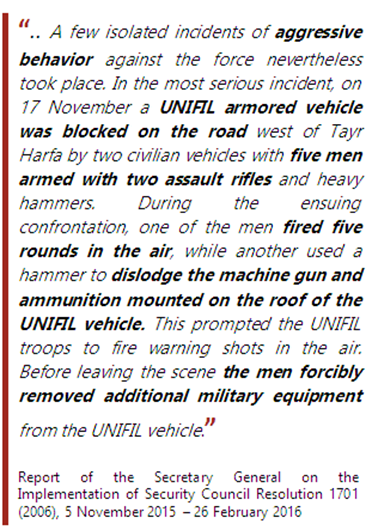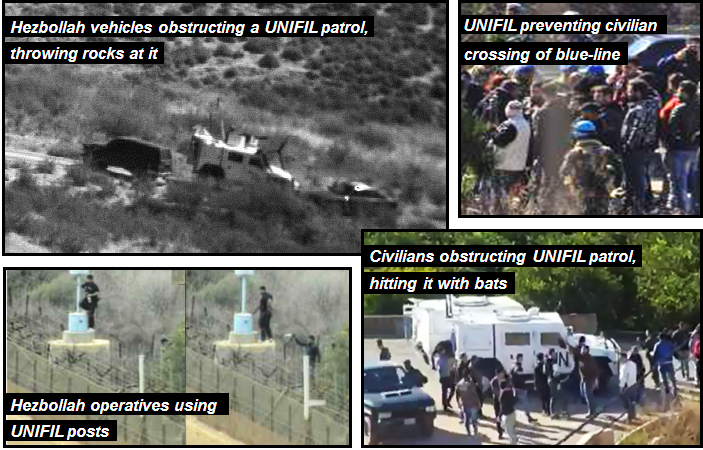Hezbollah's Systematic Violation of UN Security Council Resolutions
Over the years, and especially in the wake of the Lebanese Civil War, the Arab and international communities have passed numerous resolutions and agreements designed to bolster the stability and security of the volatile Lebanese arena. Since the Taif Agreement that ended the civil war, Hezbollah has systematically ignored and violated these resolutions.
UN Security Council Resolution 1559, passed in 2004, calls for the disarmament of all armed militias, as well as their cooperation in allowing the Lebanese State to assert its sovereignty and facilitate a free and functioning political system.
In contravention to this resolution, Hezbollah has not only refused to lay down its arms, but has also continuously threatened the political stability of the state. Hezbollah uses its weapons to assassinate political rivals in order to minimize political competition and to impose its will on the legitimate government, as was exemplified in the 2008 violent riots that Hezbollah incited against the Lebanese government.

UN Security Council Resolution 1701, passed in 2006 in the wake of the war against Israel, calls on Hezbollah to immediately cease all attacks, and on Israel to cease all offensive military operations. In addition, it sets guidelines for both parties, under certain conditions, to refrain from hostilities and maintain stability.

![]()
Hezbollah overtly and consistently violates the terms agreed upon in Resolution 1701. The organization has been amassing arms and ammunition throughout Southern Lebanon since 2006. Recent reports have shown that in addition to receiving arms transfers from Iran, Hezbollah is also building infrastructure for independent arms production within Lebanon. Furthermore, Hezbollah armed personnel can be observed along the Blue Line, occasionally crossing into Israeli territory and carrying out various operational missions. Those missions helped facilitate past hostile actions against IDF forces.

In April 2017, Hezbollah militants organized a media tour for foreign and domestic journalists along the border with Israel, citing its desire to showcase its defensive efforts in the region. Journalists were able to photograph uniformed Hezbollah fighters near the Blue Line armed with RPGs and other sophisticated weaponry, in direct violation of resolutions 1559 and 1701. Hezbollah later claimed that this tour was coordinated with the LAF, further demonstrating the influence Hezbollah wields within the Lebanese army.

Hezbollah's deception became apparent again in June 2017, it was revealed that Hezbollah had erected and used at least five observation posts along the Blue Line under the guise of the environmental organization "Green without Borders." The logo of the Hezbollah-funded organization could be viewed on these posts, which have been used by Hezbollah operatives to gather intelligence on Israeli activity near the border over the past year.
![]()

In July 2017, at least 30 Hezbollah intelligence operatives were identified as having repeatedly carried out reconnaissance along the Blue Line. Some have been spotted on the border as many as 18 times in the past year.

In December 2018, IDF forces uncovered an extensive network of underground terror tunnels crossing the Blue Line - a clear violation of UN Security Council Resolution 1701. Hezbollah dug these tunnels with the intention of carrying out surprise attacks and kidnappings of Israeli civilians and soldiers. During Operation Northern Shield, the IDF successfully exposed and neutralized these tunnels.
Hezbollah sabotages the work of UNIFIL
Hezbollah works in various ways to disrupt the activity of UNIFIL forces in Southern Lebanon, and to hamper the effectiveness of their enforcement of Resolution 1701. Although the UN Secretary General reports on the implementation of Resolution 1701 and claims that UNIFIL enjoys an overall freedom of movement, many reports note grave incidents in which the peace keeping forces were provoked or disrupted. These incidents involve both locals (mostly at the encouragement of Hezbollah-affiliated individuals, such as politicians and local leaders) and Hezbollah militants who are caught while carrying out operations, gathering intelligence or transferring arms.

Hezbollah's provocations, which are usually aimed at IDF forces, are endangering UNIFIL forces who are required to intervene. Examples of this include the use of shepherds for reconnaissance or the organization of popular demonstrations that cross the Blue Line. Worthy of note is the January 2015 incident in which Hezbollah forces fired anti-tank missiles at IDF forces near the village of Ghajar – killing two soldiers and injuring seven, causing the IDF to respond with artillery that led to the tragic death of a Spanish UNIFIL soldier.



